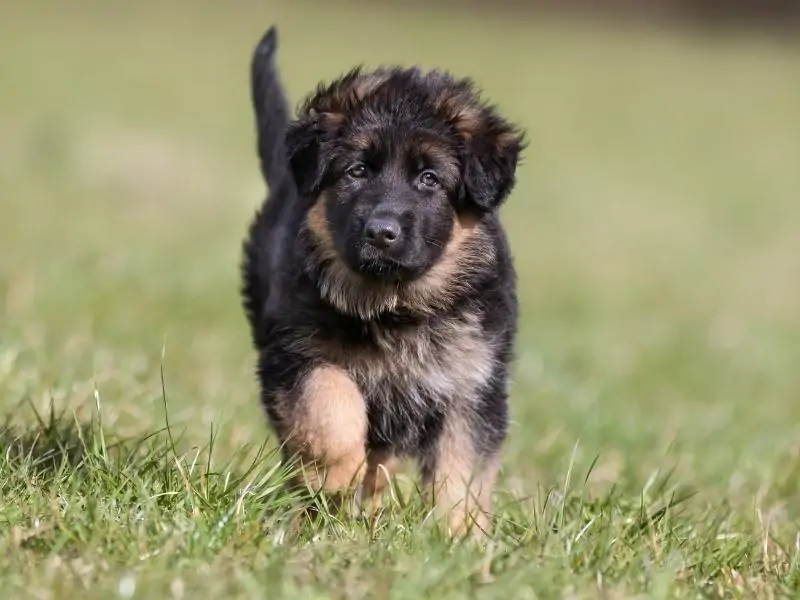At 3 months old, German Shepherd puppies are old enough to understand basic commands and start obedience training. If you own a German Shepherd puppy, now is the time to bring their training and socialization to a higher level.
But, how long should you walk a 3-month old German Shepherd? When it comes to puppies and exercise, aim for 5 minutes of exercise for each month of puppy’s age, no more than twice a day. This means that you can walk or exercise a 3-month old German Shepherd puppy for 15 minutes, twice a day. As your puppy gets older, increase exercise following this rule.
Read on to find out everything you need to know about raising a 3-month old German Shepherd dog!
How Big Is a 3-month Old German Shepherd Puppy?
A full-grown German Shepherd is a medium to a large-sized dog with an athletic and muscular build. Like many other large breeds, German Shepherds aren’t considered full-grown until they are 18-months old.
This means that your 3-month old GSD puppy has a long way to go before filling out and reaching its adult size.
Based on the German Shepherd growth chart a male GSD puppy should be between 9 and 11 inches tall at the withers. Female German Shepherd puppies are typically slightly smaller than males and stand between 8 and 10 inches tall at the shoulders.
German Shepherd 3 Months Old Puppy Development

From 3 to 6 months old, your German Shepherd puppy will go through the juvenile stage. At this time, your pup will face many changes that will help them grow into a happy and healthy adult dog.
Here’s everything you can expect seeing during the juvenile stage:
Teeth
At a 3-month mark, your German Shepherd will have all puppy teeth. However, some puppies may begin teething in this stage and will continue to do so until they have a full set of adult teeth by the age of 6 to 7 months (source).
To relieve teething pain, give your GSD safe puppy chewing toys that will massage their gums and ease their anxiety. Giving your puppy durable and soft toys to chew will keep them occupied and prevent them from chewing shoes, pillows, or destroying your furniture.
Motor Skills
As your German Shepherd puppy grows and develops you’ll notice that their motor skills are improving too. It will become clear that your pup has better coordination, self-awareness, and better balance.
While these things happen naturally as puppies grow up, regular play is very important for the development of important motor skills. Jumping, biting, shaking, rolling, and pouncing are common puppy play behaviors that improve motor skills.
Biting Reflex
Your puppy will go through a mouthing and biting phase until their adult teeth don’t set in around 6 or 7 months of age. Puppies spend a lot of their time exploring and playing using their mouth and needle-sharp teeth.
Many 3 month-old German Shepherd puppies will often bite, chew, and mouth their owners’ hands while playing. While this may seem cute now, you won’t feel the same when your adult GSD tries to mouth your hand. Thus, it’s very important to train your puppy bite inhibition and curb their mouthy behavior.
Eating Solid Food
A 3-month old German Shepherd puppy will have a full set of puppy teeth which means that you can transition them to eating solid food. Choose high-quality puppy food for large breed dogs and start feeding your puppy three meals a day.
How Much Should a German Shepherd 3 Month Puppy Eat?
As a general rule, a 3-month old German Shepherd puppy should on average eat around 2 cups of kibble daily.
However, exactly how much you’ll need to feed your German Shepherd puppy to maintain their ideal weight depends on a lot of factors. The quality of the food, calorie density, your puppy’s activity levels, and any pre-existing health problems are things you need to consider when feeding your pup.
Don’t forget, all dogs are individuals and your pup may have different nutritional needs than its littermates.
If you have any doubts about feeding your German Shepherd puppy consult your vet or a certified canine nutritionist. They will be able to tell you exactly how much you should feed your GSD puppy based on their unique nutritional needs and lifestyle.
Ideal Weight of a 3 Months Old German Shepherd
Based on a GSD weight chart, a 3-month old German Shepherd male should weigh from 22 to 30 pounds. Female puppies tend to be smaller and usually weigh from 17 to 26 pounds at 3 months of age.
Measure your puppy once a month to keep track of its development and make sure that its weight and height are within normal ranges. While you can do this at home, your vet will also measure your pup during regular checkups.
What to Do If Your GSD Puppy Is Underweight?
If you suspect that your German Shepherd puppy is underweight, schedule an appointment with your vet as soon as possible. Your veterinarian will be able to determine whether your puppy is truly underweight and either confirm your suspicions or put your mind at ease.
While insufficient food can cause a puppy to become underweight, many different health problems may also be to blame. Thus, it’s very important to get your puppy to the vet.
What to Do If Your GSD Puppy Is Overweight?
Unlike some other popular dog breeds, German Shepherds aren’t greedy eaters, however, they can still become overweight. If you can’t feel your puppy’s ribs and they look chubbier than other German Shepherds of the same age, they are probably overweight.
Lack of activity combined with overeating is the most common cause of weight gain in dogs. However, you should still take your puppy to the vet so they can examine your pooch and rule out health problems.
Training a 3 Months Old German Shepherd Puppy
German Shepherds are highly intelligent and obedient dogs, so puppy training should be a fun and exciting experience for both you and your GSD. Start training and socializing your puppy as soon as you bring them home to curb potential behavioral issues such as aggression and resource guarding.
Here are some things you should teach your puppy:
Bite Inhibition
Bite inhibition is one of the most important things your German Shepherd puppy will need to learn. German Shepherds have strong jaws, so it’s very important to teach your dog how to properly apply force with it without hurting you or anyone else (source).
The best way to inhibit your pup’s biting is to yelp every time its teeth come into contact with your skin. Your yelp will most likely surprise your dog causing them to stop what they are doing.
Once your puppy stops biting your hand, wait for 5 to 10 seconds, give them a treat or continue playing. Repeat these steps as long as necessary to teach your puppy bite inhibition.
Potty Training
Unless you want your puppy to pee and poop all-around your house, you’ll need to start potty training as soon as you bring them home. A good rule to follow is that a 2 months old puppy needs to go potty every 2 to 3 hours.
To housebreak your 3 months German Shepherd puppy take them outside every 3 to 4 hours. Keep in mind that puppies eliminate after eating, so take your GSD to the potty after every meal, after a nap, and after playing.
The idea behind potty training is to take your German Shepherd puppy outside as often as it needs to go and reward them with a treat or praise every time they pee or poop outside.
Basic Commands
While socialization and training should start as soon as you bring your puppy home, you can begin to expand your GSD puppy’s basic commands when they are between 10 and 12 weeks old.
Introduce your German Shepherd puppy to commands like “place”, “down”, and “heel at home”, and “fetch” and “drop it”, while playing with them outside. At 16 weeks when your puppy grows more, you can introduce complex commands such as stay and leave it, and start training your puppy to hold their commands longer.
Socialization
Socialization is an important aspect of training a German Shepherd puppy and should start as soon as you bring your pup home from the breeder. To properly socialize your GSD expose them to lots of different people, places, sounds, situations, pets, smells, and sights.
Every new activity or interaction must be followed by a tasty, high-reward treat. This way you are ensuring that your GSD has a positive association with new places, people, dogs, children, and strange sounds.
Conclusion
German Shepherd puppies are fun to be around, but you will have your hands full with housebreaking, socializing, and training your puppy. A 3 month-old German Shepherd puppy can start learning basic commands and their socialization process should be underway.
Your GSD puppy will start to grow rapidly at this stage and will need high-quality puppy food to fuel its body and keep it energized throughout the day. If you suspect that your pooch is leaner or chubbier than it needs to be, take them to the vet for a full checkup.
Related Articles:


0 Comments